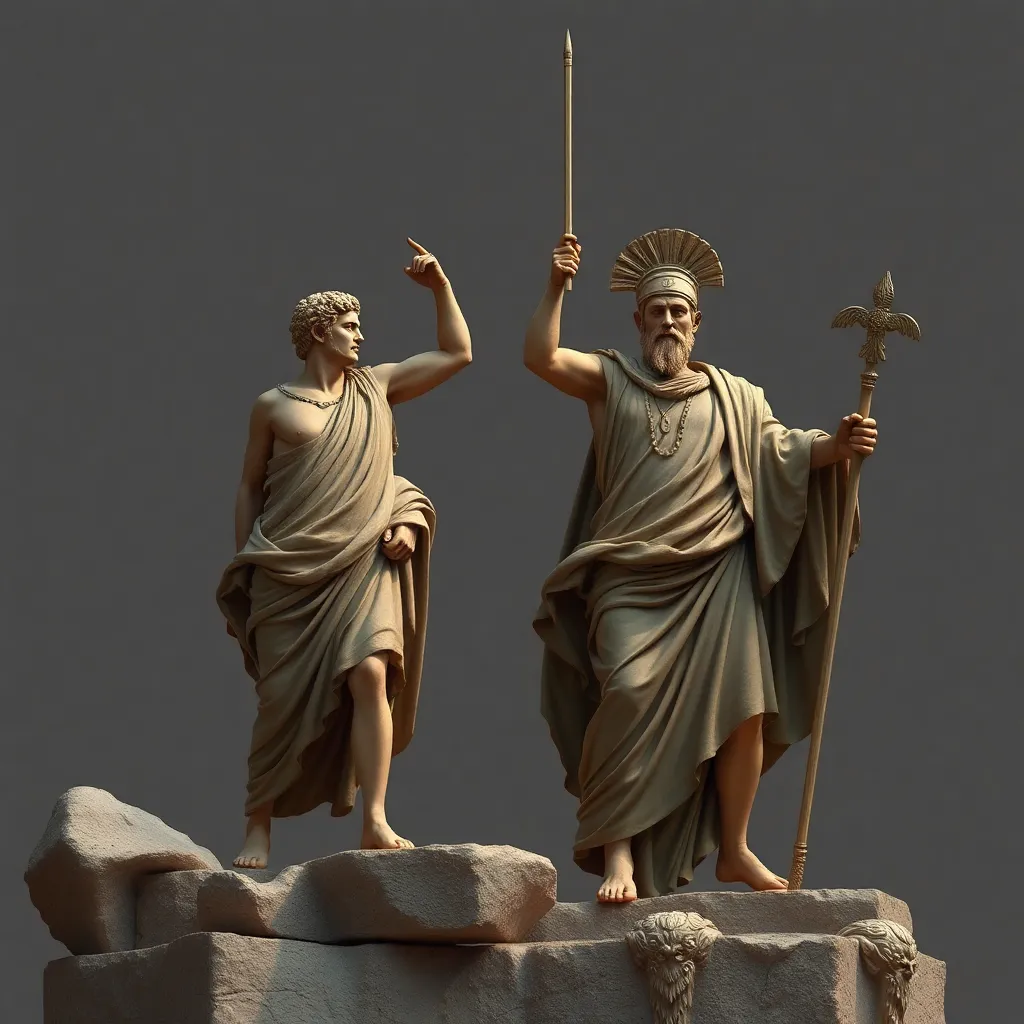The Influence of Greek Heroes on the Development of Western Literature
I. Introduction
Greek heroes have long been celebrated figures in literature, embodying ideals of bravery, honor, and the struggle against fate. These characters, often of divine or semi-divine lineage, serve as archetypes that resonate through centuries of storytelling. The significance of Greek heroes extends beyond their mythological origins; they have profoundly influenced the Western literary tradition and shaped the narrative conventions we see today.
This article aims to explore the characteristics and stories of Greek heroes, their impact on classical literature, and their legacy through the ages, culminating in their relevance in modern storytelling.
II. The Concept of the Hero in Ancient Greece
Greek heroes are defined by a set of characteristics that distinguish them from ordinary mortals. These traits include:
- Bravery and physical prowess
- Divine ancestry or favor
- Complexity and moral ambiguity
- Struggles against fate and personal flaws
Notable figures such as Achilles, Odysseus, and Heracles exemplify these characteristics:
- Achilles: The greatest warrior of the Trojan War, known for his rage and tragic fate.
- Odysseus: The clever and resourceful hero of “The Odyssey,” who embodies the journey of human experience.
- Heracles: The demigod renowned for his strength and his Twelve Labors, symbolizing perseverance against overwhelming odds.
Mythology and epic poetry played crucial roles in shaping these heroic figures, providing narratives that explored their adventures and moral dilemmas.
III. Greek Heroes in Classical Literature
The classical works of Homer, particularly “The Iliad” and “The Odyssey,” are foundational texts that showcase Greek heroism. “The Iliad” focuses on the themes of glory and honor in battle, while “The Odyssey” emphasizes the hero’s journey and the quest for identity and homecoming. Both epics established narrative techniques and thematic conventions that influenced countless authors.
Additionally, Greek tragedies by playwrights like Sophocles and Euripides further developed the concept of the hero in literature. Sophocles’ “Oedipus Rex” explores the tragic flaws of its hero, while Euripides often presented heroes who were more relatable and faced moral complexities. These works contributed to the understanding of heroism as not just about valor but also about internal struggle and ethical dilemmas.
IV. The Legacy of Greek Heroes in Roman Literature
As Roman literature emerged, Greek heroism was adapted and reinterpreted by authors such as Virgil and Ovid. The Romans revered Greek myths, and their adaptations often highlighted the virtues of duty and piety.
Notable works include:
- Virgil’s “Aeneid”: This epic poem chronicles the journey of Aeneas, a Trojan hero, showcasing themes of sacrifice and destiny, mirroring the struggles of Greek heroes.
- Ovid’s “Metamorphoses”: A narrative poem that weaves together various myths, including those of Greek heroes, highlighting transformation and the interplay between divine and human experiences.
The blending of Greek and Roman heroic ideals created a rich tapestry of literature that emphasized both the glory of individual achievement and the responsibilities that come with it.
V. The Renaissance Revival of Greek Heroes
The Renaissance marked a pivotal revival of classical texts and ideas, leading to a renewed interest in Greek heroes. Scholars rediscovered ancient works, and their influence permeated the literature of the time.
Prominent figures such as Dante, Shakespeare, and Milton drew upon the legacy of Greek heroes:
- Dante: In “The Divine Comedy,” he references classical figures, integrating their virtues and flaws into his moral framework.
- Shakespeare: His plays often explore themes of honor and tragedy reminiscent of Greek tragedies, with complex characters like Hamlet and Macbeth.
- Milton: In “Paradise Lost,” he reflects on heroism through the lens of biblical and mythological characters, blending classical ideals with Christian themes.
This period saw an evolution of the hero archetype, as they became more nuanced, grappling with existential questions and moral quandaries.
VI. Greek Heroes in Modern Literature
Greek heroes continue to resonate in modern literature, reflecting contemporary values and struggles. Various forms of storytelling, including novels, films, and graphic novels, showcase their enduring relevance:
- Novels: Works like Madeline Miller’s “Circe” reimagine the narratives of Greek heroes, focusing on female perspectives and untold stories.
- Films: Movies such as “Troy” and “300” draw upon the tales of Greek heroes, emphasizing themes of honor and sacrifice.
- Graphic Novels: Series like “Wonder Woman” incorporate Greek mythology, bringing ancient legends into modern contexts.
These modern interpretations often reflect or diverge from traditional Greek ideals, showcasing how heroism adapts to contemporary societal values.
VII. Thematic and Philosophical Implications
The exploration of Greek heroes delves deep into themes of morality, fate, and the human condition. Key aspects include:
- Morality: Greek heroes often grapple with ethical dilemmas, mirroring the complexities of human experience.
- Fate: Many stories highlight the tension between personal choice and predestined outcomes, prompting reflections on free will.
- The Hero’s Journey: This narrative structure, popularized by Joseph Campbell, draws heavily from Greek myths, illustrating universal themes of growth and transformation.
Lessons from Greek heroes resonate today, encouraging readers and audiences to reflect on their own values and struggles.
VIII. Conclusion
The enduring influence of Greek heroes on Western literature is undeniable. From their origins in ancient mythology to their adaptations in modern storytelling, these figures continue to shape our understanding of heroism. The evolution of the hero archetype reflects changing societal values and provides insight into the human experience.
As we continue to explore the narratives and themes of Greek mythology, we recognize their cultural significance and the timeless lessons they impart on heroism and morality. Greek heroes remain not only a part of our literary heritage but also a mirror reflecting our own journeys and aspirations.




